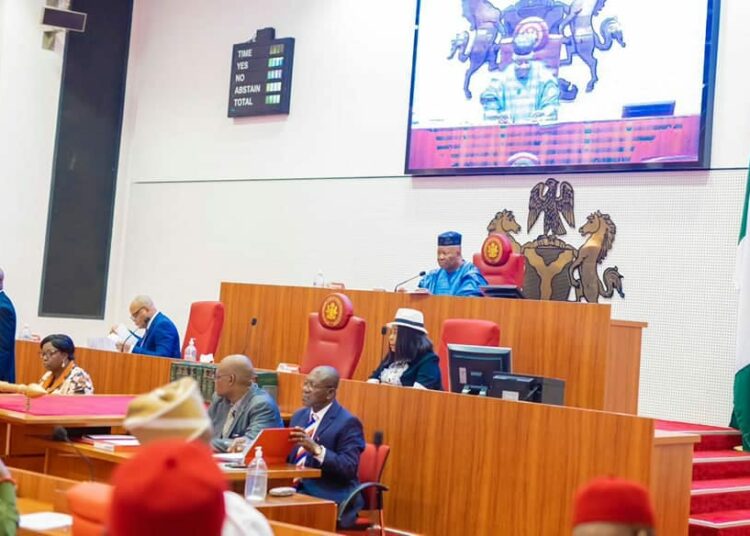The Senate, on Wednesday, passed a Bill to increase the percentage of Ways and Means loans the Central Bank of Nigeria (CBN) could give to the Federal Government from five per cent to maximum 10 per cent.
The red chamber of the Nigerian legislature effected the change through an amendment to the CBN Act 2004, a development that increases the total CBN advances (loans) to the Federal Government.
LEADERSHIP reports that the legislative action comes ironically at the time when the Senate is currently tidying its investigation into the N30trillion Ways and Means Loans granted to the Federal Government under the immediate-past administration of President Muhammadu Buhari by the CBN led by its detained former governor, Godwin Emefiele.
Recall that the Senate had in February resolved to probe the N30trn Ways and Means spent by former President Buhari-led Federal Government which according to it, was recklessly spent.
It further stated that reckless spending of the overdraft collected from the CBN under Emefiele largely accounted for food and security crises currently facing the country.
Known as the Ways and Means, the apex bank offers short-term financing or overdraft to the Federal Government to cover its budget shortfalls.
The Amendment Bill of the CBN Act was considered at plenary on Wednesday when it was read for the first time.
The Leader of the Senate, Opeyemi Bamidele, said the executive bill read for the first time on Wednesday was to enable the Federal Government to meet its immediate and future obligations owing to the government’s increasing needs for funds to finance the budget deficits and other expenses.
He explained that the loans would enable the provision of immediate funds to address budget shortfalls and finance essential government expenditures as well as help maintain financial market stability by preventing government default on its obligation.
Senator Bamidele said the loans, when injected into the economy, will stimulate economic activity, potentially create jobs and enable the government to support critical sectors like agriculture, healthcare and infrastructural development.
He added that the loans will lower the government’s borrowing cost by providing cheaper funds than the traditional borrowing method.
Opeyemi and his colleagues argued that the margin of increase should be from 5 per cent to 10 per cent.
They asserted that although the increase was necessary for economic development, adequate monitoring of capital projects should be enhanced to ensure that the funds are used for the sole purpose of infrastructure and legacy projects.
After consideration of the Bill in the Committee of the Whole, the executive bill scaled the third reading and was passed expeditiously.
Meanwhile, in the House of Representatives, some lawmakers, majorly of the Minority Caucus, staged a walkout to protest the passage of the CBN Act (Amendment) Bill 2024 by the House.
President Bola Tinubu is expected to sign the Amendment Bill into law any moment from now.











